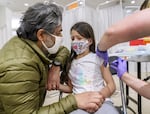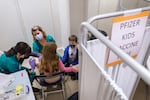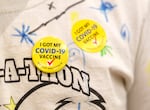
Sumeet Singh, left, comforts his daughter Mila Frey-Singh, 6, of Clackamas, as she receives her vaccination at a pediatric COVID-19 vaccine clinic held at Clackamas Town Center, Nov. 10, 2021, in Happy Valley, Ore. The clinic was offered by the Clackamas County’s Department of Public Health and offered Pfizer-BioNTech vaccines for children ages 5 through 11 years old.
Kristyna Wentz-Graff / OPB
Recently we invited kids in Oregon to leave us a message and tell us in their own words how they’re feeling about the pediatric COVID-19 vaccine.
The shot for 5- to 11-year-olds was approved by the Centers for Disease Control and Prevention earlier this month and is available in doctors offices across the state.
We’re sharing some of their observations about the vaccine along with a Q&A with Portland pediatrician Shaili Rajput and OPB health reporter Amelia Templeton.
“— Clara, 7, Portland, Oregon“I am feeling really excited for the COVID vaccine cause I can do more things. And I have butterflies in my stomach.””
“— Shelby, 8, Portland, Oregon“I think the first COV vaccine shot hurt less than the flu shot! I just got my first COVID shot on Saturday, and I was wondering if after everyone in your school is vaccinated, will you still have to wear a mask?””
AMELIA TEMPLETON: I want to start with the issue that is on everyone’s minds: masks. Kids are eager to unmask in school. Can they do that if they’re fully vaccinated?
DR. SHAILI RAJPUT: I wish I knew the answer to that. It’s a question that’s on many parents’ minds. I’m a parent as well and I have the same question. We just don’t have the guidance yet. Masking guidelines have come from the CDC, and the American Academy of Pediatrics often follows those guidelines as well. Ultimately, it’s up to states’ discretion and individual locations as well, including school districts.
I’d like to believe that eventually we can get to a place where children don’t have to be masked up in schools. But I think that’s not coming anytime in the near future, until we have more data on how [case] numbers are looking in response to vaccination numbers going up, I should say.
TEMPLETON: We asked the Oregon Health Authority this question, too, and they gave a similar answer. They said masks are going to be an important strategy until more kids are vaccinated and fewer people are getting sick from COVID in Oregon, and they haven’t given a date for when they will no longer require masks in classrooms.
Another question I heard from lots of kids and parents is about playdates: Is it safe to do indoor playdates with vaccinated friends without masks?
RAJPUT: So what I’ve been telling my patients in response to these questions is that they have to do their own calculus. They have to weigh out risk versus benefit. They have to determine what their priorities are. Is their priority avoiding infection at all costs. Is it providing a cocoon of immunity to protect high risk household members? Is it allowing a return to some semblance of normalcy which includes socializing in order to address mental health and wellness, which are equally important factors in this discussion?
It’s not a clear answer, but I think at this point, if all household members are vaccinated, if it’s a family that you know that has been careful, it’s probably reasonable to consider having that playdate with that vaccinated friend and removing masks.

(Left to right) Nursing students Maya Hermens and Melissa Christensen administer a vaccine for Ava Schwartzkoph, 9, as her brother Flynn, 8, looks on. Experts recommend having conversations with children about what to expect ahead of time.
Kristyna Wentz-Graff / OPB
TEMPLETON: How would you approach a situation where a vaccinated child wants to have a play date with an unvaccinated friend, and any advice about just approaching this kind of tricky subject with kids and parents?
RAJPUT: It’s a hard conversation to have. It can be tense, it can be awkward. My recommendation is to be direct and forthright with the family of a child’s friend who is unvaccinated, and come from a place of understanding and mutual desire to protect and do what’s best for their child.
One family might have come to a conclusion that not vaccinating their child is in that family’s best interest. A family who is on the fence about having a playdate with an unvaccinated friend also has the right not to do that, if they feel like that’s putting their child at risk.
TEMPLETON: I heard from some parents whose kids are nervous or afraid of the vaccine. We got advice on that from one child who called in and left us a message:
“— Oliver, 9, Portland, Oregon“I got the vaccine today. It hurt a little bit and and it was pretty fast so I didn’t mind. I have some suggestions about getting the vaccine. It’s good to have a distraction so you can focus on something else and it’s better to look away. Also take deep breaths to stay calm.””
TEMPLETON: I thought that was pretty good advice. What do you tell parents who have a kid who’s afraid?
RAJPUT: I am in the camp that informing your child ahead of time is a better route than having it be a surprise. And so I encourage parents to have a conversation about what’s about to take place and let them know exactly what Oliver said. It might hurt a little bit. But the shot is going to be given by people who are experts in doing what they do and they’ll make it fast and easy. I agree with taking deep breaths. I agree with providing distractions. If your child needs to bring a security device like a blanket or a lovey by all means have them do that.
TEMPLETON: One parent had a question about the dosing of this vaccine. The pediatric vaccine is a little different from the vaccine that’s approved for older children and adults. This parent is concerned that their 11-year-old is getting a shot that’s just one third of the dose that their 12-year-old child received. How do we know that these lower dose vaccines are going to protect these kids as well against infection?
RAJPUT: That’s a great question and a really common question that I’ve been getting in my practice. The study data is what’s really reassuring. It looked at close to 4,000 children and showed that this dose is very immunogenic, meaning that it creates and mounts an adequate immune response to counteract the virus.
Parents are often considering other medications that their doctors might have prescribed in the past that are weight-based, and so it seems somewhat puzzling as to why this vaccine dose would operate differently. And the answer to that is that the vaccine response is not based on weight, it’s based on immune maturity and that’s the key to the difference there. But the reassuring data tells us that the immune response is adequate at the current dose, and it’s also very safe. It’s the lowest effective dose to achieve the desired effect without causing significant side effects.
TEMPLETON: Is it reasonable to start traveling again with a vaccinated child?
RAJPUT: It falls under that category of families doing their own calculus and determining the risk versus benefits. If a family does feel comfortable — if they have, for example, a direct flight; if they’re traveling to a state where numbers are low and precautions have been taken and precautions have been in place; [or] if they’re traveling to a household where all members are vaccinated, then it’s probably reasonable to travel with their vaccinated child at this time.

Wesley DeCastro wears a button and sticker after his vaccination Nov. 10, 2021, in Happy Valley, Ore.
Kristyna Wentz-Graff / OPB
TEMPLETON: Another concern we heard from people was whether there’s a risk of compounded side effects, I think meaning greater or worse side effects, if they give a 5-year-old the COVID shot and the flu shot at the same time, which is what the current recommendation is, I believe.
RAJPUT: It’s very safe to give both simultaneously. Early in the pandemic, we were recommending that people space apart. Schedule their COVID vaccine from routine vaccinations at least by two weeks. We now know after millions of COVID vaccines have been given that they are safe to give in combination with routine vaccines, including the flu shot. Now both have potential side effects of pain at the injection site, fatigue and headache. Those are the three most common side effects for the COVID vaccine and common side effects for the flu shot as well.
I can’t tell you with certainty if those effects will be compounded. It’s hard to say. We would never be able to say retrospectively if that side effect that a child was experiencing was worse than if they had received each vaccine individually. What I can say is that I don’t recommend people wait to space them apart. It does mean more visits experiencing pokes and a couple days of feeling unwell.
That said, if for one reason or another, a parent does have to space them out, that’s fine to do as well, but there is no reason not to get them at the same time.
TEMPLETON: Is there anything you’d like to say to parents who are on the fence about this and haven’t decided if this pediatric COVID vaccine is something they feel safe with or is the right choice for their family?
RAJPUT: Our job as parents and as pediatricians is to protect children and to ensure their safety, their health and their well being. And in this age, in these times right now, I can’t think of a greater way to do that than vaccinating your children.
It is a safe and effective vaccine. It will protect them from COVID. And it will also protect those in their community that, for whatever reason — whether it be that they are too young or they’re immuno-compromised — can’t get the vaccine. I have kids who are 18 months old and almost 4 years old, and I can tell you with complete confidence that if the data that comes out in their age group looks anything like the data that we’ve seen for children five and up, I will be the first in line to get them vaccinated.

Elena Pitzel, 10, of Milwaukie, shows off her bandage after receiving her vaccination.
Kristyna Wentz-Graff / OPB
